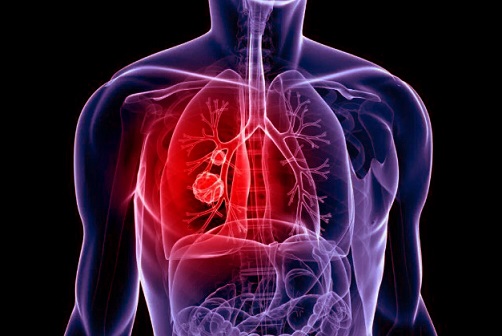Nikhil Prasad Fact checked by:Thailand Medical News Team Dec 07, 2024 4 months, 6 days, 7 hours, 43 minutes ago
Medical News: Researchers are uncovering new health concerns about COVID-19 beyond its acute symptoms. Recent studies suggest the possibility of a link between COVID-19 infection and an increased risk of lung cancer. A new study explores the connection, delving into long-term effects, molecular pathways, and shared mechanisms between the two conditions. The findings are from Northern Border University in Saudi Arabia. This
Medical News report aims to summarize their review for everyone to understand and highlights why it matters.
 COVID-19 increases the risk of lung cancer!
COVID-19 and Persistent Effects
COVID-19 increases the risk of lung cancer!
COVID-19 and Persistent Effects
COVID-19, caused by the SARS-CoV-2 virus, has impacted millions globally. While many recover, some individuals continue to experience long-term symptoms, often referred to as "long COVID." Persistent cough, fatigue, and breathing difficulties are common. For others, the damage to the lungs remains long after the initial infection.
Studies show that severe COVID-19 cases can lead to fibrotic changes in the lungs, impairing their function. These changes are typically seen in individuals who experienced severe pneumonia or required mechanical ventilation during their illness. Some experts believe these lingering effects could contribute to a higher risk of developing lung cancer. The study findings highlight how viruses might impact cellular mechanisms, raising critical concerns for survivors.
Understanding Lung Cancer
Lung cancer remains one of the leading causes of cancer-related deaths globally. It is broadly categorized into non-small-cell lung cancer (NSCLC) and small-cell lung cancer (SCLC). Factors like smoking, exposure to carcinogens, and chronic lung diseases such as COPD or pulmonary fibrosis increase the risk of developing this disease.
Symptoms often go unnoticed until the later stages. Persistent cough, chest pain, and unexplained weight loss are red flags. Early detection improves treatment outcomes, underscoring the need for vigilant screening, especially in high-risk populations.
The Possible Connection Between COVID-19 and Lung Cancer
Emerging research indicates that the lingering inflammation and damage from COVID-19 might play a role in increasing lung cancer risk. Molecular mechanisms and inflammatory pathways activated during COVID-19 infection could overlap with those linked to cancer development.
Cytokine Storm and Chronic Inflammation
COVID-19 often triggers a “cytokine storm,” an overactive immune response leading to severe inflammation. While cytokines like IL-6 are essential for fighting infections, excessive levels can cause tissue damage. Chronic inflammation is a known risk factor for cancer, as it can lead to DNA damage and disrupt normal cellular repair processes.
Molecular Pathways in Focus
Researchers have identified specific molecular pathways, such as the JAK/STAT3 signaling pathway, activated during COV
ID-19 infections. This pathway, known to be involved in cell proliferation and immune regulation, is also implicated in lung cancer. Similarly, the virus may disrupt the p53 protein, crucial for DNA repair, thereby creating an environment conducive to tumor growth.
The Role of Fibrotic Changes
COVID-19 survivors, particularly those with severe lung involvement, often show persistent interstitial abnormalities on CT scans. These changes, including fibrosis and ground-glass opacities, are linked to a higher risk of malignancy.
Could COVID-19 Be an Oncogenic Virus?
One hypothesis under investigation is whether SARS-CoV-2 might act as an oncogenic virus, similar to hepatitis B or HPV. Some studies suggest the virus can interfere with tumor suppressor proteins like p53, leading to oxidative stress and DNA damage. Another mechanism may involve the virus's non-structural proteins, which disrupt normal cell processes and promote genomic instability.
However, these findings are not conclusive. More experimental research is needed to confirm whether COVID-19 directly causes cancer or merely exacerbates existing risks.
Genetic Factors and Biomarkers
Researchers have identified genetic markers, such as the overexpression of the SLC22A18 gene and ZEB1 transcription factor, in lung tissues affected by COVID-19. These markers are also associated with lung cancer, suggesting a potential link. Understanding these genetic interactions could pave the way for targeted therapies and better diagnostic tools.
Challenges in Establishing a Causal Link
Proving a direct relationship between COVID-19 and lung cancer is complex. Factors like smoking, air pollution, and pre-existing lung conditions also contribute to cancer risk. While the inflammatory and molecular changes induced by COVID-19 are concerning, it is unclear whether they independently lead to cancer or amplify other risk factors.
Study Findings and Implications
The reviewed studies present compelling evidence of shared pathways between severe COVID-19 infection and lung cancer. They emphasize the importance of monitoring long-term respiratory health in COVID-19 survivors. Individuals with pre-existing lung conditions or those exposed to carcinogens should be particularly vigilant.
Conclusions
The link between COVID-19 and lung cancer underscores the need for ongoing research and surveillance. While a definitive causal relationship is yet to be established, the evidence points to shared mechanisms that could increase cancer risk in vulnerable populations.
Patients recovering from severe COVID-19 should prioritize follow-ups to monitor lung health. Healthcare systems must also consider incorporating cancer screenings for high-risk groups as part of post-COVID-19 care protocols. Understanding these risks can lead to better prevention, early detection, and improved outcomes for those affected.
The study findings were published in the peer-reviewed journal: Pathogens.
https://www.mdpi.com/2076-0817/13/12/1070
For the latest COVID-19 News, keep on logging to Thailand
Medical News.
Read Also:
https://www.thailandmedical.news/news/breaking-covid-19-news-44-9-percent-of-post-covid-individuals-develop-lung-fibrosis-irrespective-of-asymptomatic-or-mild-infections-jn-1-is-worse
https://www.thailandmedical.news/news/covid-19-news-sars-cov-2-triggers-epidermal-growth-factor-receptor-signaling-pathway,-leading-to-lung-fibrosis-and-lung-cancer-erlotinib-helps
https://www.thailandmedical.news/news/covid-19-news-sars-cov-2-is-likely-an-oncogenic-virus-that-will-cause-lung,-colorectal,-oral,-pancreatic-and-breast-cancers-in-the-long-term
https://www.thailandmedical.news/news/south-korean-researchers-warn-that-sars-cov-2-spike-protein-induces-lung-cancer-migration-and-invasion-in-a-tlr2-dependent-manner
https://www.thailandmedical.news/news/how-certain-cytokines-might-affect-lung-cancer-risk
https://www.thailandmedical.news/news/breaking-study-finds-that-cancer-causing-genes-are-upregulated-in-sars-cov-2-infected-individuals
https://www.thailandmedical.news/news/breaking-study-discovers-sars-cov-2-could-be-carcinogenic-as-it-causes-mutagenesis,-telomere-dysregulation-and-impairs-dna-mismatch-repair
https://www.thailandmedical.news/news/texas-md-anderson-cancer-center-warns-that-covid-19-mrna-vaccines-elevate-pd-l1-levels-disrupting-lung-cancer-treatments-progressing-other-cancers
https://www.thailandmedical.news/news/covid-19-is-not-mild-as-most-will-develop-lung-fibrosis-10-percent-of-all-lung-transplants-in-u-s-now-go-to-post-covid-patients
https://www.thailandmedical.news/news/long-term-lung-healing-even-after-mild-or-moderate-covid-19-many-could-develop-lung-fibrosis
